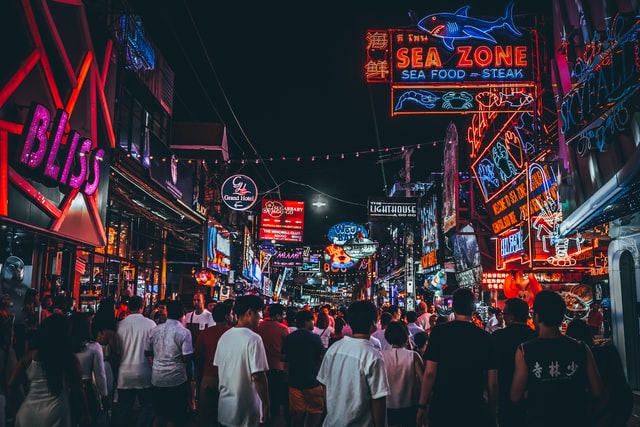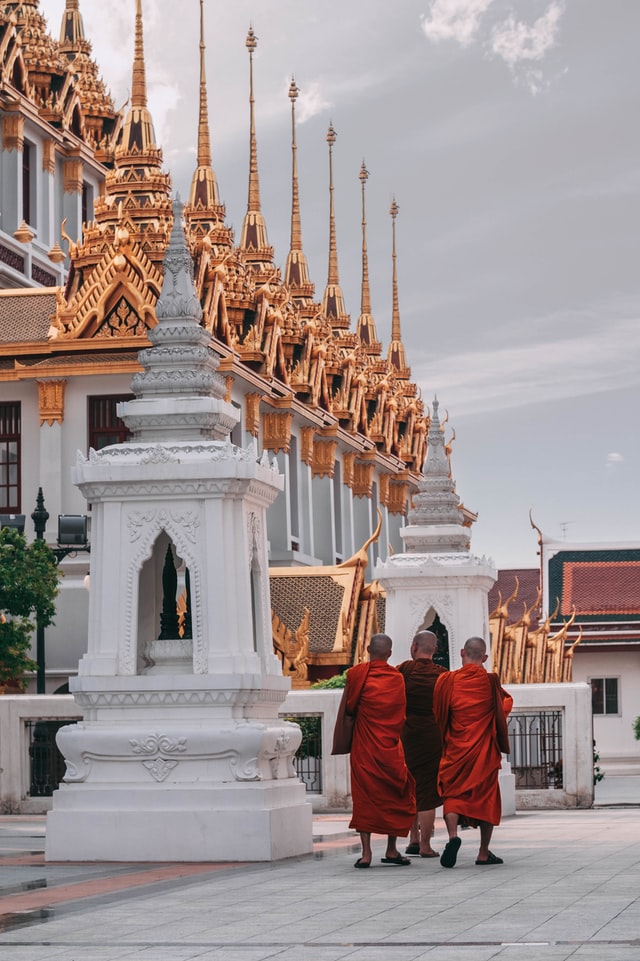Thailand is one of the most traveled nations globally because it has beautiful tourist attractions and a deep heritage. Travelers enjoy visiting Thailand due to its magnificent tourist attractions and gourmet experience. The distinctiveness of Thai culture and tradition draws tourists back to explore it all over again.
When traveling across Thailand, you’ll notice a lot of distinctions. This is because Thailand’s customs have had a profound impact on the country. For example, Buddhism and the monarchy have traditionally been seen as sources of social stability and security, and they continue to serve as emblems of Thai national unity. However, the culture is equally adaptable to modern customs and beliefs.
Thailand Cultural Facts you Should Know

As their nation has become more globalized, many Thais have adopted liberal ideals. This is evident in Bangkok, the country’s capital, which is a bustling metropolitan city with a mingling of traditional traditions and modern views.
➖Family is their Priority
In Thailand, the family usually comes foremost, with a far more significant focus on extended family than in most Western nations. If you’re shocked by the number of siblings a Thai individual has, it’s quite probable that several of them are cousins. There is no term for cousin in Thai, so cousins are referred to as brothers and sisters.
It’s common for extended families to live close together, and many Thais keep strong ties to their hometowns even after moving away for employment. If their parents must work somewhere, it is typical for children to be raised by grandmothers or distant relatives. It is the significance of extended family in everyday life. In addition, adolescent members of the family are expected to assist in the care of the elderly.
➖Their Status is Significant
Status is essential in Thai society, even if it is not immediately obvious. Age, family ties, job kinds, degrees, and economic status contribute to a person’s view of social standing. A Thai can earn or lose status depending on their situation. When a group of individuals gets together to socialize, status is important—customary; it’s for the top earner to foot the tab.
Thais use terms that show a person’s age while speaking with one another, putting pee before a more adult person’s name to pay respect and nong for someone younger than them. However, things aren’t always straightforward, since a younger person may be called to pee if they have greater status. Outsiders may overlook these little social standards, yet they are intricately deeply embedded in Thai society.
➖Showing Respect is a Big Deal
Respect and the notion of the face are possibly more essential in Thailand than in many Western countries. Thais demonstrate respect in a variety of ways, including the use of words and the wai. The failure to remove one’s footwear before entering the home is also an indication of disrespect. Mistreating someone in several ways can result in a person losing face. Another approach to make someone lose face is to yell at them in public.
There can be severe consequences for creating loss of face, with violence being a severe illustration of what might occur. Folks, families, or communities are not unusual in dealing with perceived wrongs according to societal standards; communities give out penalties as they see proper.
➖Patriotism is Very Essential to Them
The country takes pride in that it is the only southeast Asian Country that European powers have never colonized. Their national anthem is played twice a day, and everyone is expected to halt and stand until the song is complete. The national flag is flown in various places, raised every morning with the national anthem, and dropped each evening.
In theatres, the King’s hymn is played before the start of the film. Many Thais have a strong attachment to their nation, which extends to faith and the monarchy. While westerners are generally accepted in Thailand, they will always remain on the outskirts, if only marginally.
➖Their Smiles Convey a Variety of Messages
Due to the obvious continual smiles, many people consider Thailand a pleasant, joyful, and friendly country. Thailand is renowned as the Land of Smiles for a reason. On the other hand, smiles do not necessarily indicate contentment and are occasionally employed as a disguise. That’s not to say that many Thai people aren’t friendly, inviting, hospitable, and gorgeous; it’s just that a grin isn’t always what you think it is.
➖They Have a Distinct Religion
Thailand’s primary religion is Buddhism, notably Theravada Buddhism. Thailand’s theology is distinct from other Buddhist countries, having been blended with various foreign influences. To some degree, Hindu rituals and traditional Chinese ideas have affected local views. There are animist views playing a significant part in shaping Thai Buddhism into today.
Given Buddhism’s prohibition on devotion to material items, many Thai people wear amulets or carry talismans. In addition, faith in ghosts and spirits is widespread in Thailand, coming from old pre-Buddhist beliefs, and spirit temples can be found in unexpected locations.
➖They have a Lot of Superstitions
Thailand is a place of superstitions, with many people believing in ghosts and spirits. So before planning a wedding or purchasing a property, it is traditional to contact a psychic.
Providing newborn newborns a nickname arose from a wish to deceive malicious spirits who might wish to abduct the baby away. As a result, people have traditionally resisted praising parents on their new baby for fear of making the kid appear too appealing to the spirits.
➖Their Monks are Well-Respected
Throughout your visit to Thailand, you will undoubtedly see numerous monks inside and outside of temples. In Thai society, monks are greatly regarded and admired, and offending a monk is a tremendous mistake.
Monks have allotted places on public transportation, and individuals should always give up their seats to a monk if there isn’t another available. Females, in particular, should exercise caution when in the presence of monks. Females should not sit near a monk or their possessions, in addition to avoiding touching or directly delivering items to them. If you act badly near a monk in Thailand, you can be sure that the people surrounding you will promptly point out your mistakes and express their displeasure.
➖They Place Varying Importance to the Body
The head is considered the most sacred portion of the body, and you should never touch someone’s head, but most folks wouldn’t go about caressing strangers’ heads in the first place. This also applies to children; a loving ruffling of the hair may offend Thai parents.
Symbolizing filthy and inferior are the feet. It would be best if you never used your feet to touch someone, sit with your feet pointed outwards, or extend your foot at a person or a Buddha picture. Even crossing your legs might make some individuals cringe internally.
Things You Shouldn’t Do While in Thailand

Thailand is one of the most renowned tourist destinations in the world, not only in Asia. However, when visiting another nation, you cannot just do anything you want. Educate yourself to show respect for their country and its people.
❕Do not Ride their Elephants
Honoring animals is a big tradition in Thai culture, and it is reflected in many aspects of people’s beliefs. Thailand’s native animal, the elephant. It is used as a symbol throughout the country, sometimes objectifying them and compromising their health and security as a result. The Elephant Nature Park in northern Thailand rehabilitates and cares for elephants that have been injured by tourism.
The tourism sector in Thailand frequently puts these animals at risk by utilizing them as decorations during circus performances performed in front of visitors or audiences. As a result, there is an ongoing need to avoid riding elephants for pictures. People instead participate in saving and caring for these creatures by visiting rehabilitation centers such as the Elephant Nature Park while in Thailand.
❕Do not Point with your Fingers
Ensure not to use your index finger or your foot to point. It makes no difference to whom or whatever you’re aiming at. Just as striking someone on the head is impolite, pointing with your index finger or, worst, your toes is just impolite. According to Thai culture, the head is the sacred portion of the body, while the feet are the dirtiest. In addition, there are several things you should not be doing with your feet.
❕Do not Haggle too Low
If you haggle too cheap when shopping, the Thai people will be outraged and furious. So before you begin haggling, consider how much you want to spend on the thing you want to purchase. Negotiate but not too low than the original price. If you don’t think the cost is worth it, you should probably leave and go to another store that has cheaper pricing.
❕Do not be Reckless with the Buddha
A large percentage of Thais embrace Buddhism and hold the Buddha in high regard. By respecting the Buddha, you are respecting Thai culture and beliefs. So, when shooting photographs with the Buddha, don’t stand or rely on the Buddha statue and don’t replicate the Buddha’s position. Also, avoid pointing your feet at the Buddha.
❕Do not Shake Hands
It’s fascinating to read that shaking hands to say hello is uncommon in Thailand. That isn’t how Thais do things. Instead of a handshake, use the customary Thai welcome ‘wai.’ You just executed a wai by bringing your hands together in front of your body.
❕Do not Disrespect the Royal Family
This is critical: never do or say anything bad or insulting against Thailand’s King and Royal family. Whatever you do, always be courteous of the Thai Royal family. There have been several instances in the past of foreigners displaying unpleasant conduct or attitudes against the King. If you do a similar thing, it will not be beneficial for you.
❕Do not Show Public Display of Affection
Thailand is an Asian nation, and the inhabitants, seldom display romantic gestures in public. Respect the Asian culture by behaving appropriately in public. If you’re going on an amusement park trip or going out to dinner with your special someone, refrain from making out or embracing – even if you’re out on the street.
Even basic romantic gestures like holding hands are uncommon in Thailand. When you and your lover are alone, you will have many opportunities to express how much you love each other. The more secluded the setting, the more passionate it will be.
❕Do not Wear Shoe Inside
Thai folks always remove their shoes while visiting somebody’s home or most temples. This is even true in certain eateries! As a general guideline, if you notice footwear outside or individuals indoors who are barefoot, remove your shoes even if your host tells you not to.
❕Do not Buy from Kids
It may appear harmless, and you may feel as if you are doing a nice deed, but this is a big no and one of the most crucial things not to do in Thailand. By purchasing items from these young street sellers, you are enabling child labor and exploitation. These children very certainly have someone above them who collects all of their money. Furthermore, you can never be too cautious because some of these children are expert muggers.
❕Do not Whistle at Dusk
This is yet another activity that may appear innocuous to you but will irritate many individuals. You probably aren’t aware, but a Thai belief says whistling at night will bring evil spirits. People sometimes become nervous when they hear this sound late at night. This is something you should be aware of before traveling to Thailand. During the day it is okay to whistle but not at night.
❕Do not be Impatient
It would be best if you never lost your cool. The calm demeanor and lack of irritability are what Thais are known for. They even have an ideology known as “jai yen”, which translates to “cool heart.” Most people avoid conflicts and consider raising one’s voice to be quite unpleasant. Bear that in mind when in Thailand, and try to maintain your calm no matter how aggravating your situation appears.
Thailand is Well-Known For
In southern Asia, Thailand is noted for its delicious food, martial arts, coastlines, and numerous temples. Thailand also has many well-known islands with various resorts for travelers. Thailand is also a terrific destination for watersports and boat tours around the beautiful islands.

If you’ve ever eaten Thai food, you know how satisfying it is. Many of the restaurant dishes include noodles, your pick of meat, and spices that might be hot, sweet, or both. There is an abundance of culinary programs because it is famous.
If you prefer the water, you will enjoy visiting Thailand’s beaches. Phuket Island is one of the most well-known. Many resorts provide huts where you may stay right on the beach. In addition, you may rent a tent large enough to accommodate you or your complete family. There is nothing else like it in the world.
Since Buddhism is the dominant religion in Thailand, there are numerous temples and sculptures around the country. Some are located in Bangkok’s largest metropolis. These are frequently less crowded and provide you with the opportunity to observe everything without feeling rushed.
Muay Thai is a martial art that began in Thailand. It consists of hitting, punching, and wrestling. This art form may be studied in schools. Muay Thai is the foundation of practice for many hardcore warriors.
Frequently Asked Questions
Q: Thailand is known for?
A: The indigenous Thai people are responsible for most of Thailand’s culture. Buddhism is one of the most significant cultural impacts in Thailand.
Q: What is the predominant culture in Thailand?
A: Traditional Thai culture retains some Hindu, Mandarin, Burmese, Khmer, and other Southeast Asian elements. Buddhism, Animism, and Western influence all have a substantial impact on current society.
Q: Thailand has how many different cultures?
A: Thailand is home to approximately 70 distinct ethnic groups.
Q: What is the age of Thai culture?
A: From around the 11th century, Thai people began migrating into modern-day Thailand.
Q: What is Thailand’s symbol?
A: Thailand’s national and regal symbol is the Garuda, Lord Vishnu’s steed.
Final Thoughts
Thais are typically highly accommodating and realize that foreign tourists may occasionally make mistakes. Therefore, many Thais will accept different cultures as long as they are not serious, such as disrespecting the religion or monarchy or screaming in public. Thailand boasts one of Asia’s richest histories and cultures. You need to be informed.
